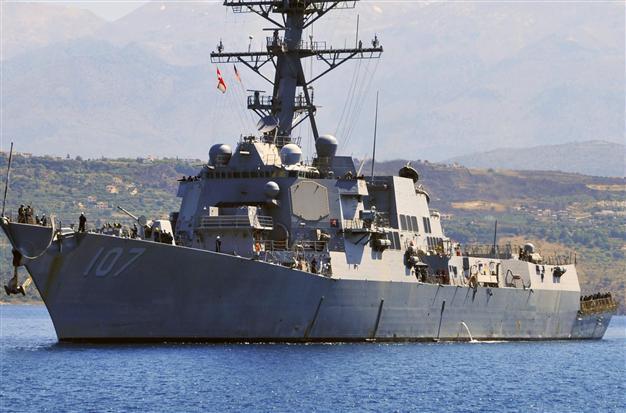Moscow warns West against Syria repeat of Iraq 'adventure'
MOSCOW - Agence France-Presse

This photo released by the U.S. Navy shows the guided-missile destroyer USS Gravely (DDG 107) arriving on June 11 for a visit at the port of Souda Bay in Greece
Russia on Aug. 25 welcomed Damascus' offer to allow a mission by U.N. inspectors probing reported chemical weapons use and warned the West that an Iraq scenario in Syria would be a "tragic mistake."
"We strongly urge those who, by attempting to impose their own results on the U.N. experts, are raising the possibility of a military operation in Syria to use their common sense and refrain from committing a tragic mistake," foreign ministry spokesman Alexander Lukashevich said in a statement.
"All this is reminiscent of events from a decade ago, when the United States bypassed the U.N. and used fallacious information on the presence in Iraq of weapons of mass destruction to launch an adventure, the consequences of which are known to all," he said.
The United States and Britain in 2003 led a military invasion of Iraq that toppled long-time dictator Saddam Hussein.
A U.N. mission had failed to find any of the weapons of mass destructions Saddam was suspected of possessing but the Iraqi strongman was known to have repeatedly used chemical weapons.
The United Nations said Aug. 25 its inspectors in Syria could begin work as early as Monday Aug. 25, after Damascus agreed to the probe Sunday during a visit by top UN official Angela Kane.
Russia took credit for the deal, saying it was the result of "relentless efforts" by Moscow with the Syrian regime.
"We are satisfied with the Syrian leadership's constructive approach towards ensuring an effective cooperation with the U.N. mission," the spokesman said.
Washington, which has said that evidence President Bashar al-Assad's regime used chemical weapons would cross a red line and warrant tougher action, said the Syrian offer was "too late to be credible".
Russia - which together with Iran and China has supported Assad throughout the 29-month-old Syrian crisis - urged the rebel camp to guarantee the safety of the UN team lead by professor Aake Sellstroem.
"It is important that the armed opposition controlling part of Eastern Ghouta ensure that the UN mission is able to operate safely and refrain from the kind of armed provocation witnessed against UN observers last summer," Lukashevich said.
Opposition leaders already said Aug. 24 that U.N. inspectors would have "unfettered" access to areas under rebel control such as Eastern Ghouta on the outskirts of Damascus to investigate the use of chemical weapons.
Doctors Without Borders has said 355 people died last week of "neurotoxic" symptoms, after the opposition claimed regime forces unleashed chemicals east and southwest of Damascus last Aug. 21 causing more than 1,300 deaths.
The regime has denied the charges and in turn accused the rebels of using chemical arms.
